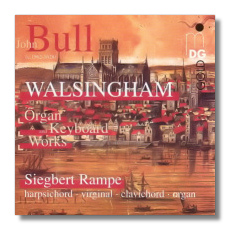
The Internet's Premier Classical Music Source
Related Links
- Bull Reviews
- Latest Reviews
- More Reviews
-
By Composer
-
Collections
DVD & Blu-ray
Books
Concert Reviews
Articles/Interviews
Software
Audio
Search Amazon
Recommended Links
Site News
 CD Review
CD Review
John Bull

Walsingham Organ & Keyboard Works
- Præludium in A minor
- Walsingham in A minor
- Christe Redemptor in A minor
- Præludium in C Major
- My Juell in C Major
- Lord Lumley's Pavan & Galliard
- In Nomine in D minor
- Præludium in G Major
- St. Thomas Wake in C Major
- My Griefe in G Major
- The Duke of Brunswicks Alman in A minor
- Fantasia in D minor
- Dr. Bulles Pavin chromatik & Galliard in D minor / D Major
- Fantasia on Ut, re, mi, fa, sol, la in G Major
- A Gigge. Doctor Bulls my selfe in G Major
- The Duchesse of Brunswicks Toye in A minor
- Fantasia Op. de fuge van magister Jan Pietersson Sweelinck in A minor
- God save the Kinge in C Major
- Een Kindeken is ons geboren
- In Nomine
Siegbert Rampe, organ/harpsichord/virginal/clavichord
Dabringhaus & Grimm MDG3411258-2 81m DDD
John Bull, probably born in 1562, is one of those exceptional 16th century composers whose historical importance rests, mainly on their keyboard works. Regarded as the Liszt of his day, his compositions still suffer from lack of sufficient exposure. This is mainly due, in part to the extremely difficult technical demands made by many of his pieces, which in most instances anticipate the great virtuoso works of the Romantic period.
His personal life, like his musical one, was a catalogue of ups and downs. Several posts acme like a bolt from the blue, and then dissipated into oblivion almost without a whimper. His genius was recognized by many, though, and two prestigious positions that came his way were those of 'gentleman in the Chapel Royal of Elizabeth I and 'doctor of music' at King's College, Cambridge.
He also performed in many European capitals like Amsterdam, Paris, Brussels and Madrid. A severe blow came in 1613 when Bull was forced to flee to the continent after causing a scandal at the London Court by supposedly having committed adultery and also insulted a church minister.
Archduke Albert VII was quick in making him Belgian court organist, but his luck ran out as well, and to avoid diplomatic complications, he was abruptly suspended. Not much later, he ended up in Antwerp, on the cathedral organ bench, where he remained until his death in March 1628.
The works on this disc are brilliant examples of his visionary art and astounding ingenuity, and the many developments they contain were only taken up some two centuries later.
If played on historical keyboard instruments, these pieces turn out to be more effective and Siegbert Rampe does not let this opportunity go by. His performances on the Scherer Organ in St. Stephen's Church in Tangermunde and the one in St. Andrew's Church in Soest-Ostönnen, plus those on the Ruckers harpsichord and the Gheerdinck virginal are dazzling gems that make these wonderful baroque inventions shine anew.
Copyright © 2006, Gerald Fenech




















